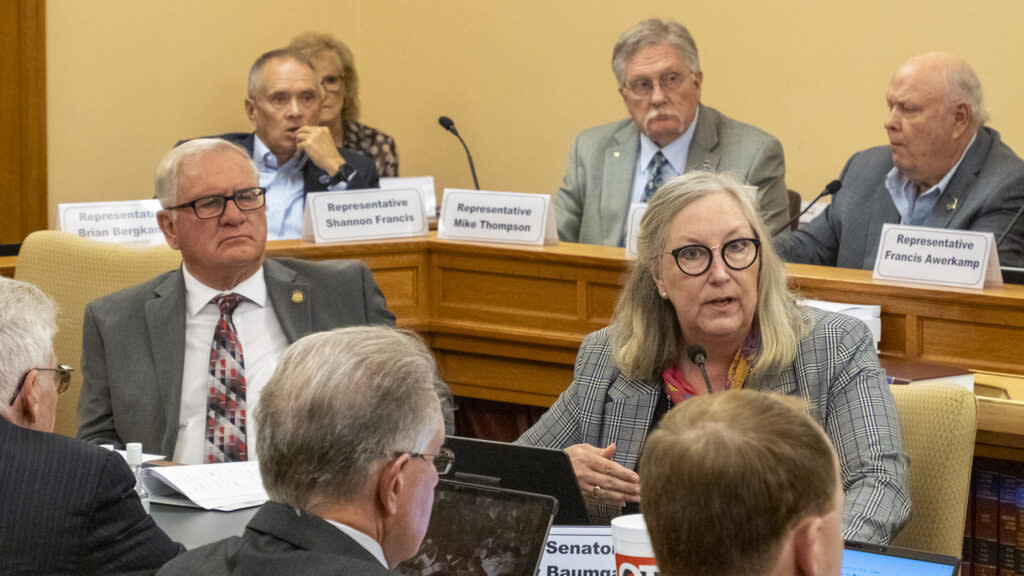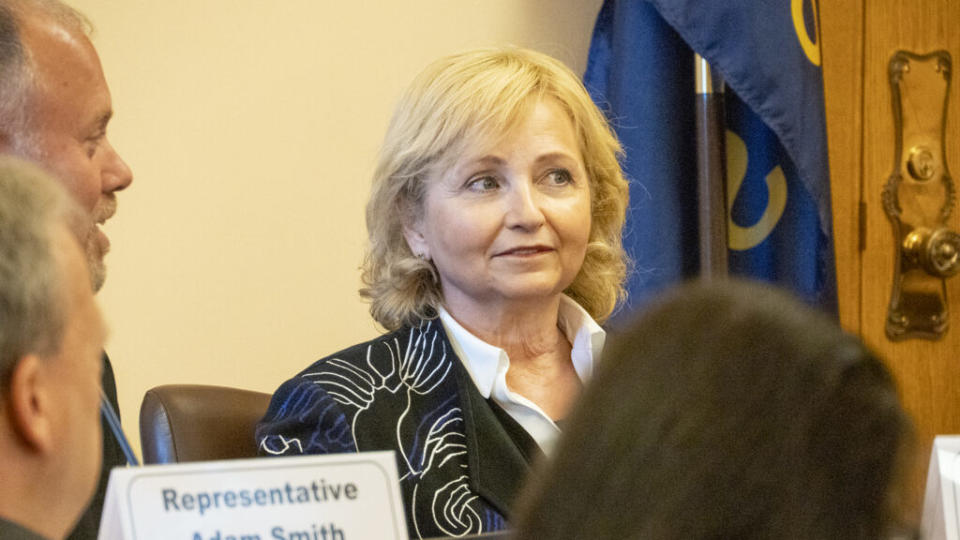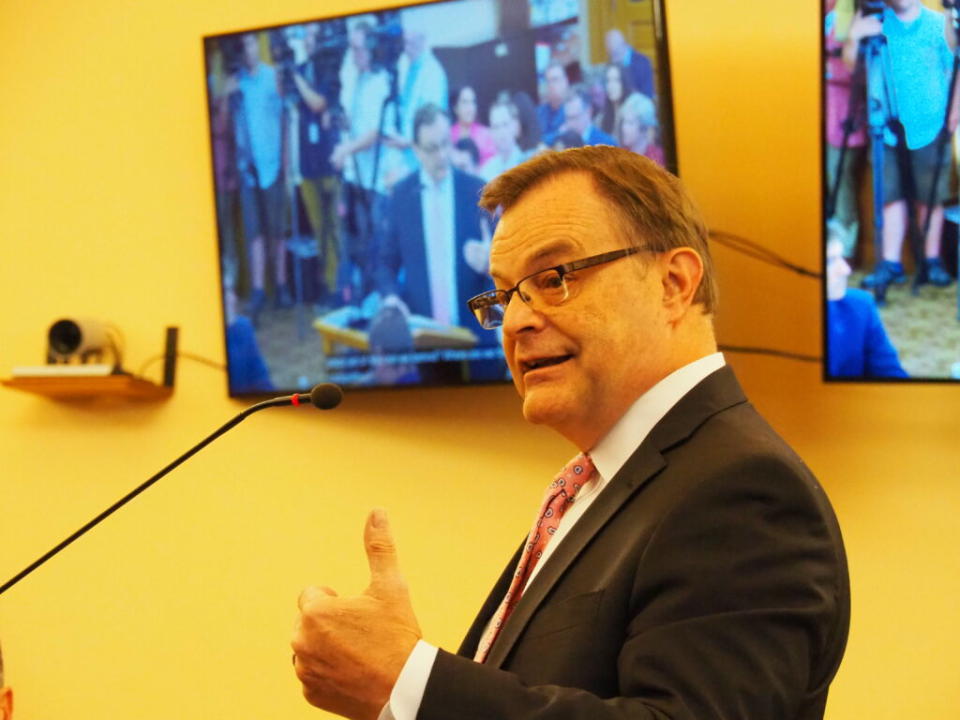Kansas GOP, Democratic legislators bitter about being elbowed out of tax bill dealmaking

- Oops!Something went wrong.Please try again later.
Sen. Molly Baumgardner, R-Louisburg, joined a bipartisan group of legislators frustrated with the process deployed by Senate President Ty Masterson, House Speaker Dan Hawkins and Gov. Laura Kelly to negotiate behind closed doors a massing income and property tax reform bill. The Legislature is to vote Tuesday on the package, but were given a copy of the bill Monday during an informal hearing on the deal. (Sherman Smith/Kansas Reflector)
TOPEKA — Republicans and Democrats complained Monday about closed-door tax bill negotiations dominated by Gov. Laura Kelly and the two top Republican legislative leaders and the abandonment of normal legislative committee processes to speed action on the deal during a special legislative session.
Members of the House and Senate tax committees gathering for a joint meeting ahead of the scheduled return Tuesday of the entire Legislature for a special session called by the governor. While the agenda has expanded to include consideration of a professional sports stadium bill, the original purpose was to consider an income and property tax plan drafted by Senate President Ty Masterson of Andover, House Speaker Dan Hawkins of Wichita and the governor. She vetoed three major tax bills during the regular session because they were too expensive.
The deal includes individual state income tax rate cuts, repeal of the state income tax on Social Security benefits, higher standard deductions and personal exemptions on the state income tax, expansion of a child care tax credit and raising of the residential property tax exemption tied to the property tax collections for K-12 public schools. Excluded from the plan was a cut in the 20-mill levy on public education property taxes and elimination on July 1 of the state’s 2% sales tax on groceries. Instead, the sales tax will be terminated Jan. 1.
Key portions of the package were drawn from Senate Bill 37, the last tax bill vetoed by Kelly. The bill, in addition to three smaller tax bills signed into law by Kelly, would consume a combined $540 million in state revenue in the first year before tapering off a range of $423 million and $427 million in three to five years.
Kelly had vowed not to accept a total tax reduction scheme that was larger than $425 million per year because she was concerned it would irresponsibly erode the state’s financial foundation.
GOP Rep. Adam Smith, chairman of the House Taxation Committee, said at outset of the joint tax meeting that printed copies of the negotiated tax bill weren’t available for distribution to legislators or the public. The formal bill wouldn’t be introduced until Tuesday, he said.
“We were notified at the end of last week in a press release that two members of the leadership and the governor had come to an agreement,” said Sen. Molly Baumgardner, R-Louisburg. “So, here we are at a significant expense, because we all filled out travel forms, and we don’t have a document to look at, which is a part of the legislative process. Help us understand how this truly is not a perfunctory process.”
Copies of the 44-page tax bill did arrive before the House and Senate committees adjourned.
“I think it’s important to say in an open public meeting why many of us that serve on the Taxation and Assessment Committee are hearing feedback from other legislators as well as the general public, because everyone’s been pretty much iced out on this,” Baumgardner said.
Nuts and bolts
House Speaker Hawkins and Senate President Masterson predicted the tax deal would win approval of the Legislature. Kelly said she would sign the bill because it “met the affordability criteria I proposed.”
Under the legislation, Kansas would move to a two-rate state income tax system with a top rate of 5.58% rather than 5.7%. The lower rate would be 5.2%, and the state would abandon existing rates of 3.1% and 5.25%. With the addition of greater standard deductions and personal exemptions, the bill would deliver $253 million in first-year income tax reductions with the amount hovering around $200 million annually in subsequent years.
The bill would exempt Social Security benefits from the state income tax. Only a dozen states impose that tax on retirees. That maneuver would deliver $152 million in the first year of the plan and the tax break would range from $120 million to $130 million in the future.
The residential property tax exemption related to funding of Kansas public schools would be raised to $75,000. Previous bills would have set that figure at $100,000, but both would be substantial raise from the current exemption of $42,000.
The measure would include a child care tax credit of 50% of the federal credit, which would double the benefit from 25%. Each 25% added to that exemption would lower state tax revenue by $6 million annually. The bill also included a $3 million to $5 million tax reduction for lending institutions.
‘Will be heard’
Sen. Caryn Tyson, the Republican chairwoman of the Senate Assessment and Taxation Committee, responded to Baumgardner by praising legislative staff for their hard work on tax legislation. She solicited a round of applause from legislators for the researchers and statute writers in the room.
She also said the state had plenty of cash reserves to afford tax cuts in the compromise bill, and welcomed the opportunity to gather input Tuesday from other lawmakers the deal.
“There are 165 legislators in this body,” Tyson said. “I do want their voices to be heard and they will be heard.”
Sen. Tom Holland, a Baldwin City Democrat who last week pitched an alternative tax bill focused on property tax relief, asked whether the objective of the joint meeting was simply a briefing for about 30 legislators or a serious effort to open debate about improving the bill. He said he wasn’t asked by Democratic legislative leaders about his view of the proposed bill.
“Were any Republican members directly consulted about components of this bill for this special session?” Holland said. “Do you view this as a transparent process?
Smith, the House tax chairman, said he couldn’t answer Holland’s question, but he confirmed neither the House nor Senate committees devoted to tax policy would convene to debate the proposed agreement. Instead, regular legislative procedure would be temporary altered so the first opportunity for senators or representatives to grapple with contents of the bill would be on the floor of the House and Senate.
“Probably go straight to the floor, I’m assuming,” Smith said.
Transparent public notice?
It wasn’t clear a meaningful effort was made by the Legislature to notify the public that testimony would be accepted on the tax compromise. Lobbyists for two conservative organizations that frequently offer opinions on tax legislation were brought up to testimony. The Kansas Policy Institute, which is associated with the Koch political family, and the Kansas Chamber, delivered lukewarm endorsements of the bill.
“It is better than a poke in the eye,” said Kansas Policy Institute CEO Dave Trabert, who indicated he would like to make dramatic changes to the bill. “Even if the governor signs it, a lot of work is still needed on property tax relief.”
He recommended the Legislature consider during the special session an amendment to the Kansas Constitution limiting increases in assessed valuation of property to 4% annually. The Senate passed a comparable amendment in 2023 by the required two-thirds majority, but the House didn’t.
“If you have enough time to run a bill for a billion-dollar subsidy for a sports stadium, I think taxpayers would say you have enough time to consider a constitutional amendment to give them some property tax relief,” Trabert said.
Eric Stafford, a lobbyist with the Kansas Chamber, said the organization’s board of directors endorsed the tax deal. He said the state had fallen behind other states in terms of moderating income tax rates. Twenty-two states lowered their top marginal income tax rate since 2021, he said. All four states bordering Kansas have income tax rates lower than Kansas’ top rate of 5.7%, he said.
“This tax relief is better than nothing. It is a step in the right direction,” said Stafford, who anticipated the House and Senate would pass the bill.
Not good enough
Several legislators, however, said they were disappointed with contents of the proposed tax compromise. The last bill vetoed by Kelly would have slashed taxation by $600 million in the first year and would have been followed by cuts of $430 million and $440 million in the four subsequent years.
Rep. Ken Corbet, R-Topeka, said it wrong for negotiators to drop an $8 million to $9 million annual property tax break for veterans and the elderly. He said a slice of the state’s $1.7 billion rainy day fund or a sliver of the $2.5 billion general surplus in the treasury, should be used to help these individuals.
“You know, it frustrates me. All the money we’re sitting on. We have to take advantage of people who needed it the most,” Corbet said. “I think that’s kind of a slap in the face.”
Rep. Lance Neelly, R-Tonganoxie, said complying with the governor’s demand that the tax package be reduced didn’t make sense given the excessive level of taxation. He suggested the Legislature add $50 million in cuts to the deal, including an exemption from property taxes for ATVs, golf carts, motorized wheelchairs and other alternative vehicles.
“I do not like the way the process was done,” Neelly said. “It was very frustrating to many on both sides. We all want to turn around and give as much as we can back to the taxpayer.”
The post Kansas GOP, Democratic legislators bitter about being elbowed out of tax bill dealmaking appeared first on Kansas Reflector.


